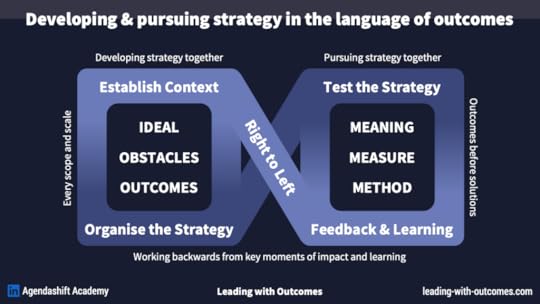The wholeheartedness equation
I have a confession to make. I still haven’t delivered the revised manuscript for my fourth book, but in spare moments I have begun work on my fifth, working title Wholehearted: Inside the Deliberately Adaptive Organisation, business agility at every scale. There’s nothing like writing to make you revisit things that you thought were settled, and here I am looking again at wholehearted, for five years now the title and theme of Agendashift’s mission. Perhaps you haven’t thought of it in quite these terms before, but if you want your organisation to grow in wholeheartedness, then we’re here to help.
Tentatively (as questions), let’s take Lean’s¹ “eliminate impediments” and apply it not to flow, but to wholeheartedness. Viewed from two sides (as a system, if you like):
If we eliminate impediments to wholeness, does that improve “heartedness”? If, for example, we simplify lines of communication or address issues of trust or coherence, do we make it more likely that people will be more engaged, acting with purpose and energy?
And going the other way, if we eliminate impediments to “heartedness”, does that improve wholeness? If, for example, we can relieve overburden, might the capacity freed thereby be used to tackle deeper, more structural issues?
I think it’s fair to say that there’s a limit to how much progress you can make on one side of the wholeheartedness equation before the other side begins to dominate. If it’s wholeness you seek, you need heartedness also, and vice versa. Note, however, the “more likely” and “might” in my examples. Be careful of men bearing virtuous circles! If there is a virtuous circle here, we must (as I have written before) ask what mechanisms sustain it. That’s not delivered by wholehearted on its own, but we do have that covered. Keeping wholehearted doing what it does best, representing an ideal to pursue:
In Leading with Outcomes: Foundation , we first explore what it means to lead in a wholehearted organisation (experience shows it to be a helpful way to think about leading in transforming organisations more generally), and then its main focus, the interdependent patterns of developing and pursuing strategy in the language of outcomes.In Adaptive Strategy: Business agility at every scale , we explore the Deliberately Adaptive Organisation, an accessible, situational, and complexity-aware presentation of the Viable System Model , in which questions of sustainability and (dynamic) balance are never far away. Wholehearted appears there as one of several models of trust-building leadership.But today’s exercise: if you want your organisation to grow in wholeheartedness, which of its two sides most need your attention? Then what happens?
¹Further to that Lean inspiration, Philippe Guenet tells me that there are encouraging resonances with The Flow System (Brian Rivera, John W. Turner, and Nigel Thurlow). I haven’t read that yet, but now I think about it, I’m not surprised. It’s on my list.
Related:
Picturing Foundation (May) Adaptive Organisation (II) is complete – and with it, Leading with Outcomes too (April)Upcoming eventsWith me (Mike Burrows) unless otherwise indicated.
June:
20-22 June, London, UK – 1-day, 2-day, and 3-day tickets available, each day certified:Leading in a Transforming Organisation
(Leading with Outcomes: Foundation and Adaptive Organisation I & II)27 June, online meetup, 18:00 BST, 19:00 CEST, 1.00pm EDT:
Between spaces, scopes, and scales: What the scaling frameworks don’t tell you
July:
06 July, 18:30 BST, Nottingham, England:Between spaces, scopes, and scales: What the scaling frameworks don’t tell you 11 July, online, 15:00 GMT, 16:00 CET, 10am ET:
Free webinar/AMA: Where to start? Where next?
Later:
12-20 September, online, Tuesday & Wednesday afternoons (UK time):Leading with Outcomes: Train-the-Trainer/Facilitator (TTT/F) 09 October, Melbourne, Australia:
Kanban Australia 2023 09 November, online meetup, 11:30 GMT, 12:30 CST, 06.30am ET:
Between spaces, scopes, and scales: What the scaling frameworks don’t tell you 1-2 December, Bengaluru, India:
Kanban India 2023
Leading with Outcomes from the Agendashift Academy
“Leadership and strategy in the transforming organisation”
Leading with Outcomes is our modular curriculum in leadership and organisation development. Each module is available as self-paced online training or as private, instructor-led training (online or in-person). Certificates of completion or participation according to format. Its four modules in the recommended order:
Leading with Outcomes: Foundation Inside-out Strategy: Fit for maximum impact Outside-in Strategy: Positioned for success Adaptive Organisation: Business agility at every scale (parts I and II, a certificate for each)Individual subscriptions from £24.50 per month, business subscriptions from £269 per month, with discounts available on both kinds of plan for employees and employers in the government, healthcare, education, and non-profit sectors.
For public training events, see our Events calendar. These are discounted for subscribers when the event is operated by us.
To deliver Leading with Outcomes yourself, see our Authorised Facilitator and Trainer Programmes. Our next TTT/F trainings take place in September (online) and December (Bengaluru, India).
Agendashift : Serving the transforming organisation
: Serving the transforming organisation
Links: Home | Subscribe | Events | Media | Contact | Mike
Agendashift Academy: Leading with Outcomes | Trainer and Facilitator Programmes
At every scope and scale, developing strategy together, pursuing strategy together, outcomes before solutions, working backwards (“right to left”) from key moments of impact and learning.




